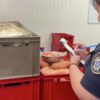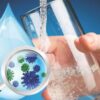 Food Manifest
Food Manifest
The house of resource for food safety.
Salmonella
- Home
- Salmonella

Smart Ways to Keep Eggs Fresh and Safe0
- A to Z
- May 15, 2025
Eggs are one of the most commonly used ingredients in kitchens across the world. They’re nutritious, budget-friendly, and can be cooked in countless ways. But eggs are also highly perishable. If not handled or stored properly, they can spoil quickly or become contaminated with harmful bacteria like Salmonella. This can lead to foodborne illnesses that
READ MORE
Dead Snake in Midday Meal Sickens Over 100 Students0
- A to Z
- May 3, 2025
Report India’s Midday Meal Scheme, designed to nourish millions of school children, aims to combat malnutrition and improve learning outcomes. Experts have consistently emphasised how balanced meals support both physical and cognitive development in growing kids. But in a disturbing turn of events, over 100 students in Mokama, Bihar, fell sick after eating their midday
READ MORE

Experts Urge Karnataka to Ban Raw Egg Mayonnaise0
- A to Z, Food Hygiene, Food Safety, Health & Wellness, News
- May 2, 2025
Report Following Tamil Nadu’s one-year ban on raw egg mayonnaise over Salmonella concerns, health experts are urging Karnataka to implement a similar measure. Effective May 8, the ban targets the rising risk of food poisoning linked to raw egg-based mayonnaise, which can cause severe gastrointestinal illness and, in extreme cases, life-threatening complications. Karnataka Food Safety
READ MORE
Food Irradiation Explained: Why Irradiated Food Isn’t Radioactive0
- Food Hygiene, Food Safety, General, Health & Wellness
- April 24, 2025
Have you ever noticed a label that says “irradiated” on a pack of spices or dry fruits and wondered what it means? The word might sound technical or even alarming, but there’s no need to worry. It’s not about nuclear energy or anything dangerous. Food producers use a method called food irradiation to make food
READ MORE
Latest Posts
-

-

Why You Should Never Ignore Pink or Red Egg Whites
- A to Z, Food Hygiene, Food Safety, Health & Wellness, News
- January 28, 2026
-

-

Over 120 Fall Ill in Siberia After Eating Ready Meals
- A to Z, Food Hygiene, Health & Wellness, News
- October 22, 2025
-

Reheat Eggs the Safe Way: Keep Them Tasty and Germ-Free
- A to Z, Food Hygiene, Food Safety, General, News
- October 11, 2025











